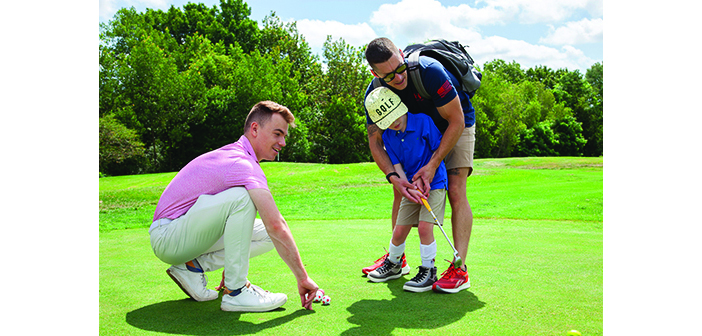Adaptive golf clinics get kids with disabilities hooked on the game.
It was a warm and sun-drenched day on a Providence driving range in mid-July, but Josh Harris wasn’t slowing down. As fast as his volunteer could place golf balls on the rubber tee, Harris hit his shot pure and straight, then waited impatiently for the next ball to be loaded.
Josh, 21, has spina bifida and is legally blind, but that was no obstacle on this day. Aided by a ParaGolfer—a wheelchair that raises its user into a standing position—he swung purposefully at golf balls for well over an hour.
“He’ll swing until he has blisters on his hands,” says his father, David. “As long as someone keeps putting the balls down, he’ll keep hitting them. He’ll do this all day.”
It’s a welcome reprieve and a chance at a moment of normalcy. Josh and his parents have faced endless trips to Hasbro Children’s Hospital, “22 surgeries in 21 years of life,” and years of physical therapy, according to his father.
But that also led them to Paula Kleniewski, a physical therapist and high school golf coach who in 2016 founded the nonprofit Full Swing Golf RI, which hosts adaptive golf clinics for players ages 3 to 21. The July clinic, hosted by Button Hole Golf Course in Providence, introduced golf skills to those who may not have otherwise had a way to learn the game.
The organization’s purchase of the ParaGolfer was a game changer for Josh, who is sports-obsessed but struggled in the outset with golf, often striking his legs while trying to swing from a traditional wheelchair.
“For a kid who’s wheelchair-bound to be able to stand up and golf like everybody does, that’s not an opportunity he gets every day,” David says.
Behind him were a host of volunteer instructors, many of whom have specialized training in physical or occupational therapy, or are studying medicine. One of those volunteers, Jack Casey MD’26, paused a lesson with another young golfer to give Josh some encouragement.
Casey is a golf lifer, having grown up in Pinehurst, NC—a community known the world over for its golf prominence. Kleniewski, who says she started Full Swing to give children and their families an outlet and show they can succeed, says that Casey’s golf passion and his medical background have been a perfect fit for her organization.
“I’m thankful every day that Jack Googled our program,” she says. He has brought not only his experience to the organization but also additional volunteers from Brown, as well as grant money from the Medical School’s Patient Advocacy Coordinating Council that has helped pay for clinics, swag bags, and golf course use.
“Everything you see is in a book for the first two years of medical school,” Casey says. “But then you get to get out there with these kids and put a face to that disease you’ve been reading about, and you see they’re hitting the ball and smiling and having fun.”
Kleniewski says golf is uniquely suited to the needs of children with physical and emotional challenges. “Golf is so individualized,” she says. “We can take the game and adapt it to meet their physical and emotional needs.”
Casey is working to extend the players’ season, by partnering with Brown’s golf team to organize a winter adaptive clinic using indoor golf simulators at the University. For Josh and his father, that means more opportunities to play the game they both love—together.
“It’s more meaningful when you think back to the initial diagnosis,” David says. “They give you all the lists of things he’s never going to do, and then to get the opportunity to play golf with your son … it’s phenomenal. You don’t take it for granted.”




